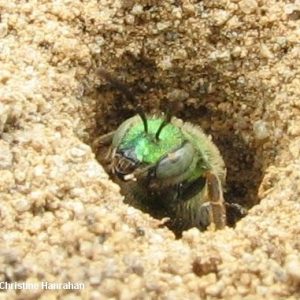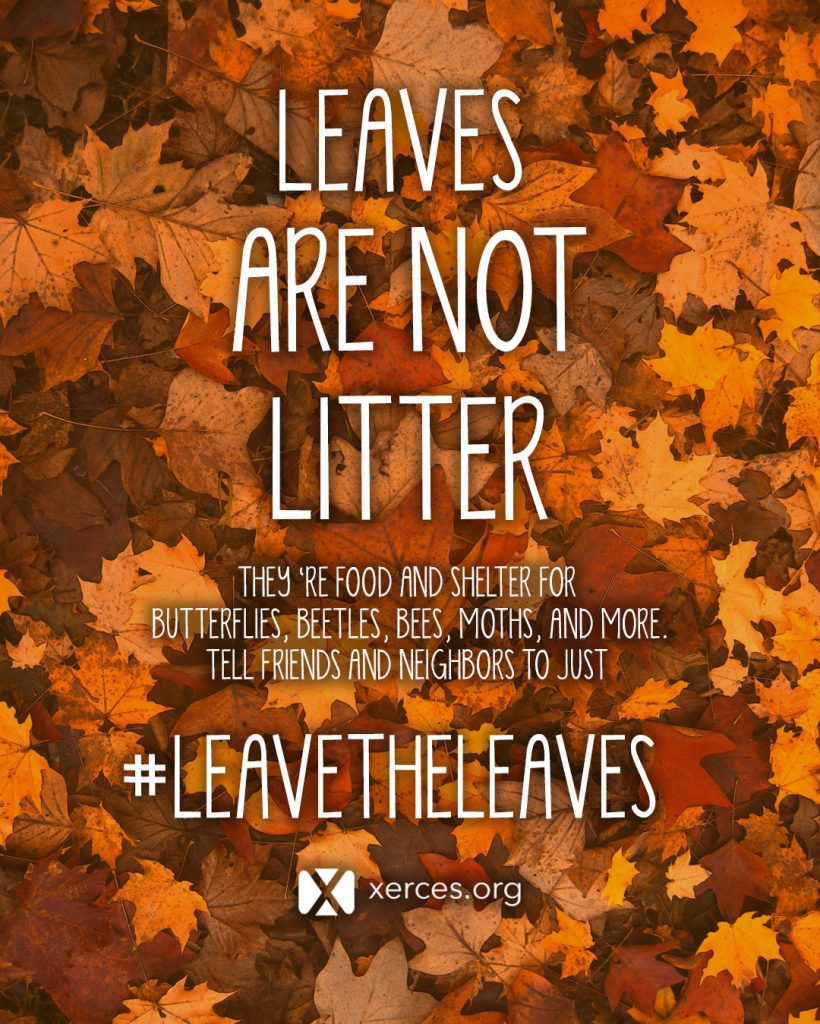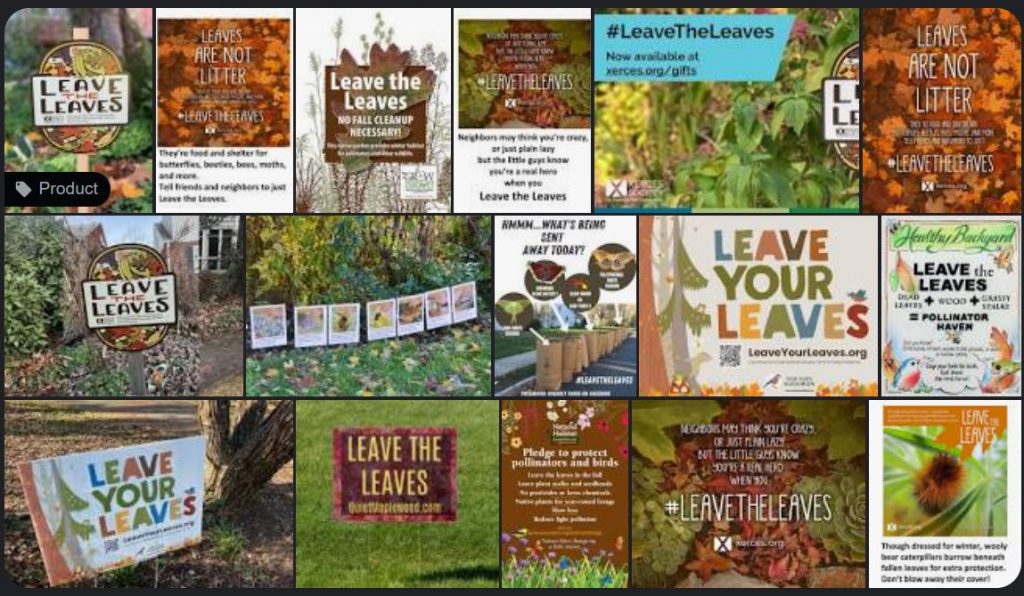by Sandy Garland
Every year, I put the Xerces poster on my Facebook page and exhort my friends and neighbours to “leave the leaves.” And every year I see yard waste bags full of leaves at the curb on garbage pickup day. Why do people keep throwing away the best compost and mulch they will ever come across? Why do they kill the pollinators they need so badly in their gardens?
Leaves improve soil
I first learned about the value of leaves in a garden course I was taking at Algonquin College. I don’t remember the teacher’s name, but I sure remember what she called fall leaves: “gardeners’ gold”! If your soil is on the clayey side, add leaves to loosen it up. If it’s sandy, add leaves to retain water. If it’s just right, leaves will replenish the nutrients and act as mulch. Composted leaves improve any kind of soil. No brainer!

An Halictid bee, just emerging from an underground tunnel where it has been laying eggs and provisioning them with pollen and nectar. The offspring will overwinter underground and emerge next spring. Over 60% of our bees are ground-nesting. Photo by Christine Hanrahan.
Leaves protect insects
Then we learned about how insects are in trouble. And I believe the experts who say that if the insects die out, we will soon follow. Where do insects overwinter? In leaf litter. Or in the ground covered with a blanket of leaf litter. Note: some shelter under tree bark or in cracks, but most overwintering insects depend on leaves to protect them from drying out and freezing.
Circle of life
Finally, leaves on the ground are part of a healthy ecosystem. In spring, your tree puts out a fresh set of leaves to capture the sun, using that energy to make the nutrients it needs – and the oxygen we need as a byproduct. When temperatures drop in the fall, photosynthesis slows until the chemical reactions just can’t work any more. At that point, the tree drops its leaves because they have become a liability. They can’t make energy (too cold), but they can still lose water and weigh the branches down with ice and snow, so the tree gets rid of them – temporarily.
If you sweep away those fallen leaves, all the nutrients the tree made this year will be lost. Why not leave them to decay naturally, so the tree can use the nutrients to grow new leaves in the spring? That’s what happens when people are not around.
Don’t believe me
Many, many conservation organizations have done the research, put out the word. Yes, it’s wise to leave the leaves on the ground. They are needed, now more than ever.
Xerces Society – “One of the most valuable things you can do to support pollinators and other invertebrates is to provide them with the winter cover they need in the form of fall leaves and standing dead plant material.” Reinforced by the Canadian Wildlife Federation.
David Suzuki Foundation – “Those brown, dead leaves are the planet’s butterfly nursery. They’re home to butterfly larvae, microbes and worms. And leaf litter is where many species of butterflies and moths overwinter as pupae. Animals like toads, shrews and salamanders benefit from leaf litter to hide and hunt, too.”
Nature Conservancy of Canada – “Many animals, such as toads, frogs and some moths and butterflies, have adapted to hibernate in the leaf litter. The leaves provide an insulating blanket, which can help protect these animals from the cold and temperature fluctuations during the winter. Many species of insects also need plants stalks or dead branches for hibernation. By completely cleaning up our gardens and yards, we may be removing important wintering habitats for native wildlife in our communities.”
National Wildlife Federation – “Traditionally, leaf removal has entailed three steps: Rake leaves (or blast them with a blower) into piles, transfer the piles to bags and place the bags out to be hauled off to a landfill. Yet, increasingly, conservationists say these actions not only harm the environment but rob your garden of nutrients while destroying wildlife habitat. The alternative? ‘Let fallen leaves stay on your property,’ says National Wildlife Federation Naturalist David Mizejewski.”
US Department of Agriculture – “Micro-organisms are the life of soil, and they need food and nutrients all the time. The more leaves left on your garden, the more feed for these micro-organisms that make soil healthier and plants grow stronger. As the leaves decay, they add organic matter back into the soil, which lessens the need for fertilizer.”
The Weather Network – Piles of leaves in municipal waste facilities don’t have sufficient oxygen to decompose. Instead they release the greenhouse gas methane.
Dozens of botanical gardens, foundations, universities, and environmental movements are urging us to leave our leaves. They’re right!! Get the message!


This is worth reminding everyone about and repeating for those who need more nudging. Leaving the leaves mainly means leaving them in the garden beds, not on the lawn since they would kill the grass. If you still have a lawn, rake them off into the flower beds. If you don’t have room, offer them to your neighbours. Maybe you could use piles of leaves to kill off the lawn in an area you would like to convert to a pollinator garden!
Saying that leaves “will kill the grass” is an exaggeration. It depends on the type of leaves, their thickness, moisture, and how long they remain. A thin layer of shredded leaves (mulched with a mower) is actually excellent for the lawn: it nourishes the soil and helps suppress weeds.